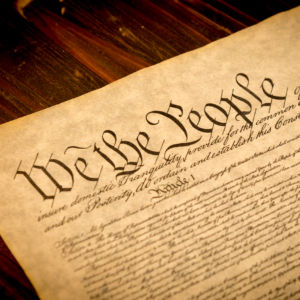The Florida Supreme Court recently issued a long-awaited ruling stripping the right to vote from citizens with a felony conviction until they’ve paid all fines and fees associated with their incarceration.
The ruling comes less than a year after nearly 65 percent of Florida voters approved a ballot initiative to restore the right to vote to around 1.4 million ex-offenders, and would newly disenfranchise nearly half of them.
In Florida as elsewhere, criminal justice fines and fees — which on average amount to $13,607 per person — keep millions of Americans trapped in debt long after they’ve completed their sentence, increasing the odds of recidivism and harming entire communities.
The decision clearly implicates one constitutional right: the right to vote. But the ruling also underscores a key constitutional gap. Unlike the majority of constitutions globally, the U.S. Constitution fails to prohibit discrimination based on income or other aspects of socioeconomic status — and the consequences for our democracy may be profound.
In a new study, we looked in detail at the 193 U.N. member countries’ constitutions, examining their protections for equal rights. What we found was that 59 percent of constitutions explicitly guarantee equality based on socioeconomic status. The United States does not.
Although the 14th Amendment broadly establishes “equality before the law,” the Supreme Court has repeatedly held that poverty is not a “suspect class” — meaning that class discrimination receives no special constitutional protection, unlike discrimination based on race, gender or religion.
And the latest example from Florida is the tip of the iceberg: laws and policies that directly limit political engagement based on class are rampant nationwide. Thirty-five states have enacted voter ID laws, which evidence shows disproportionately exclude low-income voters as well as black, Latinx and elderly voters. Some states require photo ID, which not only requires extensive time and documentation to obtain but also comes at a cost.
Further, discrimination based on income and credit can have vast consequences for housing and employment. For example, in most states, it’s perfectly legal for landlords to refuse to rent to prospective tenants who plan to use a housing voucher to pay part of their rent, even though they would be paying the exact same amount as their neighbors. Studies have shown that this form of legal discrimination reinforces segregation and increases the risk of homelessness.
Meanwhile, in many states, employers use credit scores in their hiring processes, even for jobs with no relationship to handling finances, such as maintenance. In a 2014 survey of low- and middle-income households with credit card debt, one in 10 unemployed respondents had been told that they were disqualified for a job by their credit history.
Globally, the good news is that constitutional protections on the basis of socioeconomic status are on the rise. Whereas just 34 percent of constitutions adopted before 1970 protect equal rights across social class, 83 percent of those adopted from 2010-2017 do so. Still, constitutional protections for equal rights across class remain less common than those addressing gender (85 percent of constitutions), race (76 percent) or religion (78 percent).
Furthermore, cases from countries worldwide indicate why prohibiting socioeconomic status discrimination matters. In Belgium, the Constitutional Court held in 1993 that “blue collar” workers were entitled to the same sick leave as “white collar” workers.
In Nepal in 2009, the Supreme Court struck down a school’s admissions policy that allowed students only from the highest caste — a hereditary distinction of high social class — to enroll. And in Kenya, the High Court found that withholding critical medical services from two women who were unable to immediately pay their bills was unconstitutional discrimination on the basis of economic status.
To be sure, constitutionally prohibiting social class discrimination would not fix inequality on its own, nor would its effects be immediate. But it would provide a foundation for challenging discriminatory laws and practices that threaten our democracy.
In 2016, voter turnout among the poorest households was just 48 percent; among the richest, it was 86 percent. While there are many factors that contribute to this gap, laws and policies like voter ID laws and felony disenfranchisement have exacerbated it.
When the U.S. Constitution was first adopted, white, male, property-owners were the only citizens allowed to vote in many states. Well into the 20th century, poll taxes and other Jim Crow laws continued to disenfranchise millions on the basis of race and class.
Today, more than 90 percent of Americans rank the right to vote as among their most important constitutional rights. Conditioning the right to vote on adequate income undermines this ideal, and threatens the gains in rights achieved over centuries.

